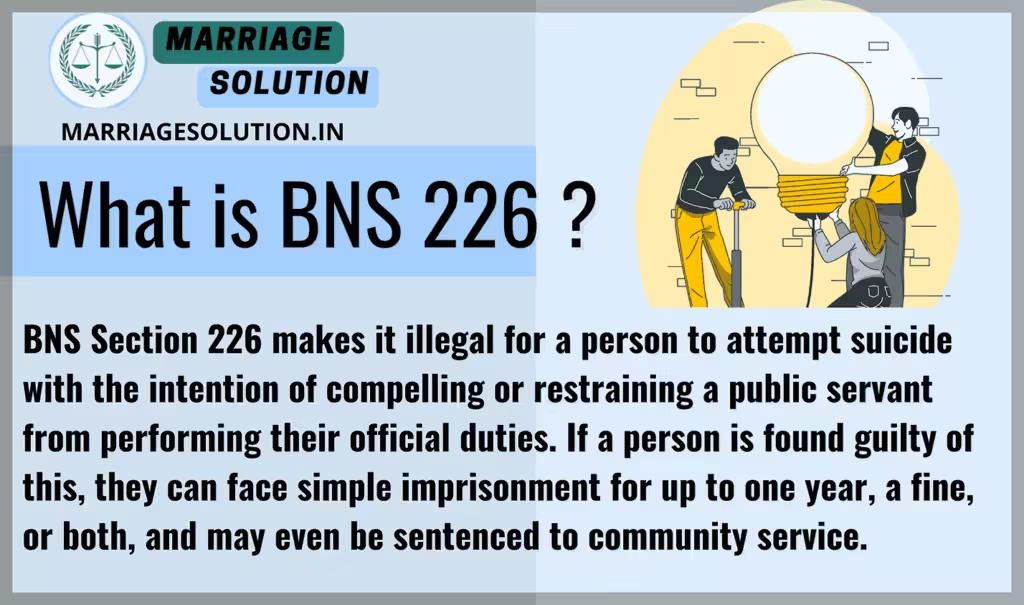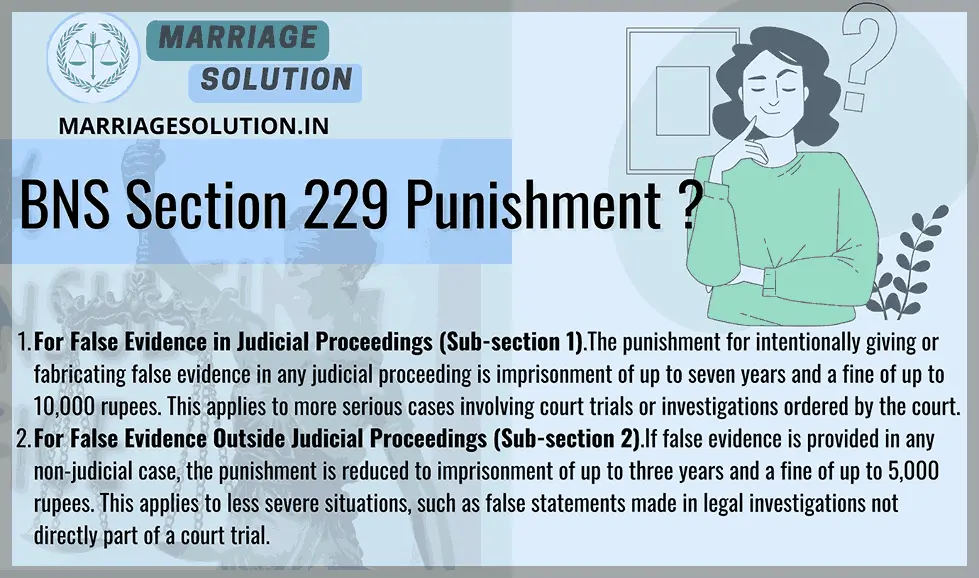Introduction of BNS 226
BNS 226 criminalizes the act of attempting suicide with the intention of compelling or stopping a public servant from performing their lawful duties. It ensures that government officials are not manipulated through acts of self-harm. The law prescribes imprisonment, fines, or even community service, emphasizing both punishment and reform.
What is BNS Section 226 ?
BNS Section 226 makes it illegal for a person to attempt suicide with the intention of compelling or restraining a public servant from performing their official duties. If a person is found guilty of this, they can face simple imprisonment for up to one year, a fine, or both, and may even be sentenced to community service.

Under Section 226 of the bns act 2023
“Whoever attempts to commit suicide with the intention of compelling or restraining a public servant from exercising their lawful authority, shall be punished with simple imprisonment up to one year, or with fine, or with community service, or with both.”
1. Meaning of “Suicide Attempt to Influence Public Servant”
- It means trying to harm oneself (attempt suicide) not for personal reasons but to manipulate or stop a public servant from doing their lawful duty.
- Example: Threatening to jump from a building unless the officer cancels an eviction.
- The focus is on misuse of self-harm as a way to pressure public servants.
2. Who is Covered?
This section applies to:
- Any individual attempting suicide to force a public servant’s action.
- People who try to stop lawful government duties (like eviction, arrest, confiscation).
- People who attempt suicide to gain undue advantage (like permits, illegal benefits).
3. Nature of the Offence
- Non-cognizable → Police cannot arrest without a warrant.
- Bailable → Accused has the right to seek bail.
- Non-compoundable → Cannot be settled privately; must go through court.
- Triable by any Magistrate → Case handled at local level.
4. Examples of BNS Section 226
Example 1 – Preventing Eviction
A man climbs a water tank and threatens to jump unless police stop his house demolition. He is guilty under Section 226 for attempting suicide to stop lawful duty.
Example 2 – Forcing Illegal Action
A woman drinks poison in front of a government officer demanding an unauthorized permit. She attempted suicide to compel illegal action, punishable under Section 226.
Example 3 – Not Guilty Case
If a person attempts suicide due to personal stress or depression (with no link to influencing a public servant), Section 226 does not apply.
5. Punishment under BNS Section 226
- Imprisonment → Up to 1 year (simple imprisonment).
- Fine → Amount decided by the court.
- Community Service → Court may order social work instead of or in addition to fine/jail.
- Both → In some cases, imprisonment + fine + community service may be imposed.
6. Importance of BNS Section 226
- Protects public servants from coercion or emotional blackmail.
- Prevents misuse of suicide attempts to obstruct justice or lawful orders.
- Balances punishment with community service option – ensuring reform.
- Reinforces integrity of public administration.
Section 226 BNS Overview
BNS Section 226 makes it an offense to attempt suicide with the intention of compelling or restraining a public servant from discharging their official duties. If someone is found guilty, they can face up to one year of imprisonment, a fine, or both. Additionally, they may be required to perform community service.
BNS Section 226 – 10 Key Points Explained
- Attempt to Commit Suicide:
This section applies when a person tries to commit suicide, not with personal intent but to influence a public servant’s decision or action. - Purpose of the Suicide Attempt:
The law punishes those who attempt suicide with the intent to either compel (force) or restrain (stop) a public servant from performing their lawful duties. - Public Servant’s Duty:
The attempt must directly aim at influencing a public servant’s official actions, such as compelling them to take or avoid certain actions related to their duties. - Imprisonment for the Offense:
A person convicted under this section can be punished with simple imprisonment for up to 1 year. The imprisonment is a form of punishment for attempting to manipulate the lawful actions of public officials. - Fine as an Option:
Apart from imprisonment, the offender can also be fined. The court may impose a fine based on the circumstances of the case. - Community Service:
In addition to or instead of imprisonment or fine, the offender may also be required to perform community service. This provides a form of punishment focused on public welfare. - Non-Cognizable Offense:
The offense is non-cognizable, meaning that the police cannot arrest the accused without a warrant issued by a magistrate. - Bailable Offense:
BNS Section 2226 is bailable, which means the accused can apply for bail and may be released from custody while the trial is pending. - Non-Compoundable Offense:
This offense is non-compoundable, which means that it cannot be privately settled between the accused and the victim. The case must go through the court system. - Triable by Any Magistrate:
Cases under this section are triable by any magistrate, making the judicial process quicker and simpler, as magistrates have the authority to hear and decide the case.
Two Simple Examples for BNS Section 226:
Example 1:
A man attempts to jump off a building, threatening to end his life unless a police officer agrees to stop a planned eviction. The man’s intent is to prevent the officer from carrying out his lawful duty (the eviction). Under BNS Section 226, this man could be punished with up to one year of imprisonment, a fine, or community service for attempting suicide to restrain the public servant.
Example 2:
A woman consumes poison in front of a government official, demanding that they grant her an unauthorized land permit. She intends to force the official to take an illegal action by threatening her life. Under BNS Section 226, she could face imprisonment, a fine, or community service for trying to manipulate the official’s actions through a suicide attempt.
BNS 226 Punishment
- Imprisonment: The convicted person can be sentenced to simple imprisonment for up to 1 year.
- Fine or Community Service: The court may also impose a fine or require the offender to perform community service as an alternative or additional punishment.

BNS 226 bailable or non bailable ?
Yes, BNS Section 226 is a bailable offense. This means the accused has the right to be released on bail while awaiting the trial.
Comparison Table: BNS Section 226 vs IPC Section 309
| Section | What it Means | Punishment | Bail | Cognizable? | Trial By |
|---|---|---|---|---|---|
| BNS Section 226 | Covers attempt to commit suicide. It focuses not only on punishment but also on helping the person with counseling and care, showing a more humane approach. | Imprisonment up to 1 year, or fine, or both. | Bailable | Non-Cognizable | Any Magistrate |
| IPC Section 309 (Old) | Punished a person for attempting suicide. It treated the act as a criminal offence without considering mental health or emotional distress. | Imprisonment up to 1 year, or fine, or both. | Bailable | Non-Cognizable | Any Magistrate |
| Key Difference: BNS 226 modernizes IPC 309 by keeping the same punishment but adding a compassionate approach. It recognizes mental health issues and focuses on help and rehabilitation, not just punishment. | |||||
BNS Section 226 FAQs
What is BNS Section 226 about?
BNS Section 226 punishes anyone who attempts suicide to compel or prevent a public servant from performing their lawful duties.
What is the punishment under BNS Section 226?
A person found guilty can face simple imprisonment for up to 1 year, a fine, or community service, or both.
Is BNS Section 226 a cognizable offense?
No, it is a non-cognizable offense, meaning the police cannot arrest without a warrant from the court.
Is BNS Section 226 bailable?
Yes, the offense is bailable, allowing the accused to be released on bail.
Can the offense under BNS Section 226 be settled privately?
No, it is a non-compoundable offense, meaning it must go through a court trial and cannot be privately settled.
Who can try cases under BNS Section 226?
Cases under this section can be tried by any magistrate, making the legal process more accessible.
Conclusion
BNS Section 226 strikes a balance between protecting public servants and addressing misuse of suicide attempts as a tool for coercion. While it punishes offenders with jail, fine, or community service, it also highlights the importance of reform. By ensuring that no one can manipulate officials through extreme self-harm, this section safeguards the smooth functioning of justice and government authority.
Need Legal Support?
If you are dealing with court cases, marriage problems, or any other legal issue, our team at Marriage Solution – Lawyer Help is here for you. Simply fill out our quick online enquiry form, and we’ll connect you with the right legal expert to support your needs.
Finished with BNS 226 ? Continue exploring the next provisions of the Bharatiya Nyaya Sanhita (BNS), 2023. Each section includes explanations, examples, and plain-language breakdowns for easy understanding.
Chapter XIV – Of False Evidence And Offences Against Public Justice.
- BNS 227 : Giving false evidence.
- https://marriagesolution.in/bns_section/bns-227/
- BNS 228 : Fabricating false evidence
- https://marriagesolution.in/bns_section/bns-228/
- BNS 229 : Punishment for false evidence.
- https://marriagesolution.in/bns_section/bns-229/
- BNS 230 : Giving or fabricating false evidence with intent to procure conviction of capital offence.
- https://marriagesolution.in/bns_section/bns-230/
- 231 BNS : Giving or fabricating false evidence with intent to procure conviction of offence punishable with imprisonment for life or imprisonment.
- https://marriagesolution.in/bns_section/231-bns/
Full IPC Section List: https://marriagesolution.in/ipc-section-list
All Indian Law & Blogs: https://marriagesolution.in/indian-law/
Full BNSS Section List: https://marriagesolution.in/bnss_section-list
